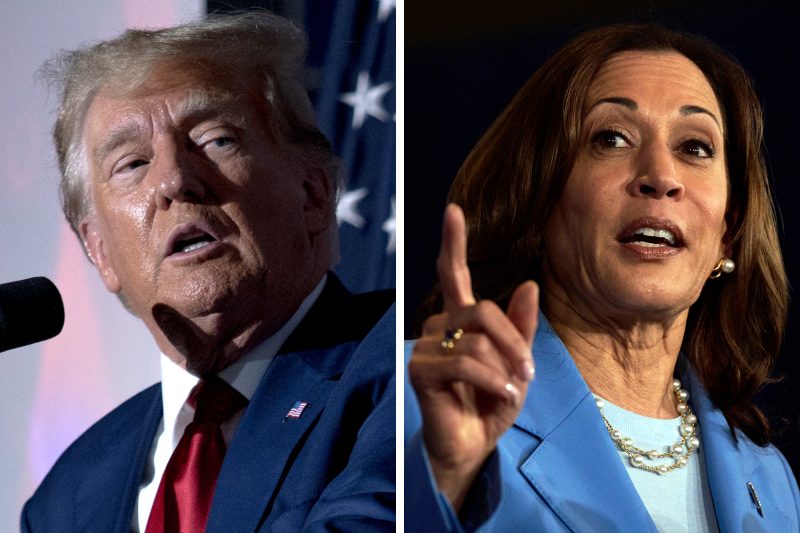July 30, 2024
Harris and Trump’s Duel Over Social Security and Medicare Claims
 Harris and Trump's Statements on Social Security and Medicare: Examining the Claims
Harris and Trump have been at the forefront of the political landscape, each with their own perspectives and promises regarding crucial programs like Social Security and Medicare. Let's delve into their statements and claims, dissecting and analyzing the potential implications of their proposed policies.
Harris, with a background in law and public service, has expressed her commitment to protecting and strengthening Social Security and Medicare. She has emphasized the importance of these programs as essential safety nets for millions of Americans, especially the elderly and vulnerable populations. In her speeches and policy proposals, Harris advocates for increasing funding to sustain and expand these programs, ensuring their long-term viability.
On the other hand, Trump, a businessman turned politician, has taken a different approach to Social Security and Medicare. Throughout his presidency, Trump has made various statements about these programs, often sparking debates and controversies. While some view his efforts to reduce government spending on entitlement programs as necessary for fiscal responsibility, others criticize his proposed cuts as potentially harmful to those who rely on these benefits for their livelihoods.
One of the key points of contention between Harris and Trump lies in their respective stances on privatization. Harris has been vocal in opposing any moves towards privatizing Social Security or Medicare, citing concerns about increased costs and decreased access for those in need. Trump, on the other hand, has expressed openness to exploring privatization as a means of potentially improving efficiency and reducing government involvement in these programs.
Harris has also highlighted the importance of addressing disparities in Social Security and Medicare benefits, particularly for women and minority groups who often face greater financial challenges in retirement. She has proposed measures to address these inequalities, such as adjusting benefit calculations and expanding access to affordable healthcare services for seniors.
Meanwhile, Trump has focused on reducing fraud and abuse within Social Security and Medicare, emphasizing the need for enhanced oversight and accountability. While efforts to combat fraud are generally supported across party lines, critics argue that Trump's approach may disproportionately impact low-income beneficiaries who rely heavily on these programs for their basic needs.
In conclusion, Harris and Trump's statements on Social Security and Medicare reflect their divergent ideologies and policy priorities. While Harris emphasizes the importance of protecting and expanding these vital programs, Trump leans towards cost-cutting measures and potential reforms that could reshape the future of entitlement benefits for millions of Americans. As the political landscape continues to evolve, it is essential for citizens to stay informed and engaged in discussions about the future of Social Security and Medicare to ensure the well-being of current and future generations.
Harris and Trump's Statements on Social Security and Medicare: Examining the Claims
Harris and Trump have been at the forefront of the political landscape, each with their own perspectives and promises regarding crucial programs like Social Security and Medicare. Let's delve into their statements and claims, dissecting and analyzing the potential implications of their proposed policies.
Harris, with a background in law and public service, has expressed her commitment to protecting and strengthening Social Security and Medicare. She has emphasized the importance of these programs as essential safety nets for millions of Americans, especially the elderly and vulnerable populations. In her speeches and policy proposals, Harris advocates for increasing funding to sustain and expand these programs, ensuring their long-term viability.
On the other hand, Trump, a businessman turned politician, has taken a different approach to Social Security and Medicare. Throughout his presidency, Trump has made various statements about these programs, often sparking debates and controversies. While some view his efforts to reduce government spending on entitlement programs as necessary for fiscal responsibility, others criticize his proposed cuts as potentially harmful to those who rely on these benefits for their livelihoods.
One of the key points of contention between Harris and Trump lies in their respective stances on privatization. Harris has been vocal in opposing any moves towards privatizing Social Security or Medicare, citing concerns about increased costs and decreased access for those in need. Trump, on the other hand, has expressed openness to exploring privatization as a means of potentially improving efficiency and reducing government involvement in these programs.
Harris has also highlighted the importance of addressing disparities in Social Security and Medicare benefits, particularly for women and minority groups who often face greater financial challenges in retirement. She has proposed measures to address these inequalities, such as adjusting benefit calculations and expanding access to affordable healthcare services for seniors.
Meanwhile, Trump has focused on reducing fraud and abuse within Social Security and Medicare, emphasizing the need for enhanced oversight and accountability. While efforts to combat fraud are generally supported across party lines, critics argue that Trump's approach may disproportionately impact low-income beneficiaries who rely heavily on these programs for their basic needs.
In conclusion, Harris and Trump's statements on Social Security and Medicare reflect their divergent ideologies and policy priorities. While Harris emphasizes the importance of protecting and expanding these vital programs, Trump leans towards cost-cutting measures and potential reforms that could reshape the future of entitlement benefits for millions of Americans. As the political landscape continues to evolve, it is essential for citizens to stay informed and engaged in discussions about the future of Social Security and Medicare to ensure the well-being of current and future generations.
If you would like to delve into the world of investment topics , go to our partner project Wall Street Wizardry


